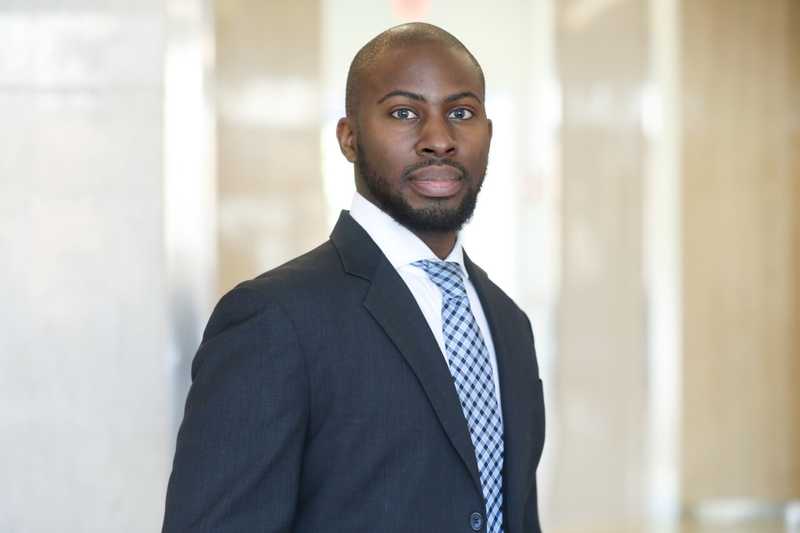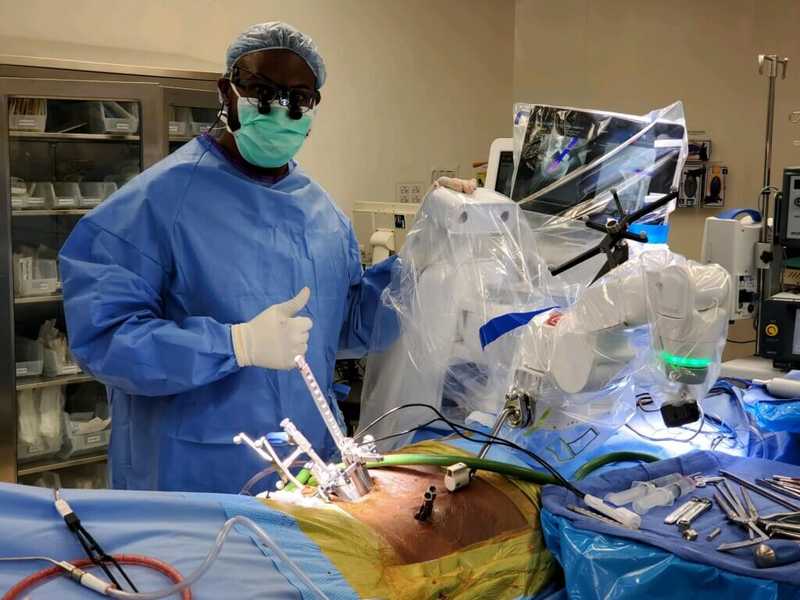
Share
Uchechi Iweala is an Orthopedic Spine Surgeon at the Centers for Advanced Orthopedics. As a spine surgeon, he focuses on studying anything that hampers a patient's ability to move properly. He performs surgery to give his patients the best chance of getting back to their baseline mobility. He recently became one of the first surgeons in Maryland to perform a navigated lumbar spinal fusion with robot assistance. He has also published numerous peer-reviewed academic papers and book chapters related to healthcare and technology, including research on how to improve patient outcomes from a mechanical and anatomical standpoint and understanding how technology could improve the delivery of patient care in sub-Saharan Africa.
 Photo credit: Uchechi Iweala
Photo credit: Uchechi IwealaI feel privileged to be a surgeon because of the impact and improvement that I can have on my patients’ lives.
Thank you very much for agreeing to do this interview with us. Can you please introduce yourself to our readers? What do you do?
Hello to The Africa I Know community! My name is Uchechi Iweala. I was born and raised in the Washington DC area, and my family is from Nigeria. I developed a strong connection to Nigeria from annual trips to visit extended family, usually for 2 months out of the year. I enjoy athletics, sports, and especially music. I am an orthopedic spine surgeon.
Can you tell us about your education background?
I earned my BA in economics from Harvard College and MD/MBA from Harvard Medical and Business Schools. I completed my residency in orthopedic surgery at George Washington University and fellowship in spine surgery at New York University.
Have you always wanted to be a scientist? How did you find your passion for medical sciences?
I have always wanted to be a scientist. I enjoy working on difficult problems and using a mix of scientific principles and creativity to find the right answer. There is always something new to discover in the sciences, so to me, it never becomes boring.
My father inspired me to become a physician; he graduated from neurosurgical residency in Scotland and later practiced emergency medicine in the US. I feel privileged to be a surgeon because of the impact and improvement that I can have on my patients’ lives.
Can you tell us what orthopedics is all about and what an orthopedic surgeon does?
Orthopedic Surgery is the field of medicine concerned with patient mobility. We focus on anything that limits or hampers a patient's ability to move properly – including broken bones, torn ligaments / tendons / muscle, or arthritis. If a bone is broken and is unstable, we perform surgery to re-align it and give our patients the best chance of getting back to their baseline mobility. For other conditions, such as arthritis, we treat patient's pain with therapy and medications. If these interventions don't work, we may opt to perform surgery to relieve a patient's pain. For example, in spine surgery (my subspecialty), we often remove bone or ligament that pinches nerves, and sometimes we fuse the spine to relieve a patient's back and extremity pain.
You have published numerous peer-reviewed academic papers and book chapters. What are your research interests, and what kind of problems does your research solve?
I am very interested in research related to healthcare, technology, and the intersection of the two. When I was in business school, I was keen on understanding how technology could improve the delivery of patient care in sub-Saharan Africa. This led me to write a thesis focused on the electronic medical record market in Ghana and Nigeria. As a spine surgeon, my research has primarily focused on how to improve patient outcomes from a pain and recovery standpoint as well as a mechanical and anatomical standpoint. I look forward to continuing my research in these areas, and applying lessons learned in real-world contexts.
You recently became one of the first spinal surgeons in Maryland to perform a successful navigated lumbar spinal fusion using a robot. What motivates you to excel and break barriers?
I enjoy using cutting edge technology that helps improve outcomes for the patient. I find that the robot improves efficiency by reducing the number of intraoperative fluoroscopy shots needed to otherwise place pedicle screws percutaneously. The robot also gives me confidence that my assistant will place the pedicle screws on their side accurately, because the trajectory of the screws are planned using three dimensional CT imaging. I am always searching for technologies (both hardware and software) that will help me deliver first-rate care to patients and drive optimal outcomes.
What are you most proud of?
I recently became a father, and my daughter centers me. I am proud of her for living her best life and grasping new realities each and every day. It’s inspiring to watch her grow. I want to continue to be able to give her opportunity to thrive. I have a fantastic wife whose love and support I’m very grateful for. She is also an inspiration to me, and I often tell her that she’s the smartest person I know. I benefit from her advice, thoughts, and conversation as we both work to do the best we can for our family and in our careers.
What is something that someone wouldn't know by looking at your profile? Any fun facts?
A fun fact is that I take my music very seriously. I have 14,000 songs in total in my library. I’m mostly a fan of Afrobeat, hip-hop, R&B with a sprinkle of EDM or jazz mixed in. I curate my playlists by season. I’ve just started making my “Winter 2022” playlist.
Finally, what are your pieces of advice for the African youth?
What I will advise is that any goal that a young person has, they should think long term about how to achieve it. I think if someone says “I want to make X” or “I want to become Y,” then they should also add, “it would be nice if I could get this done next year, but if it takes me 15 years to do it then that will still be a success.” Sometimes it takes time to achieve your dreams and things don’t move as quickly as we’d like. But if you’re thinking long term and making small steps each year to get just a bit closer to the goal then you eventually get to the right place.
Know someone we should feature? Or are you of African descent and would you like to share your journey with us? Email us at editors@theafricaiknow.org
Our Newsletter
Subscribe to our newsletter to keep up with our programs and activities, learn about exciting developments in Africa, and discover insightful stories from our continent's history.